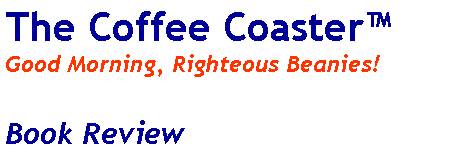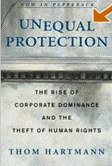

|
 |
|
|
2006 November 28
|
Please go to the new Coffee Coaster site implemented more gracefully in Wordpress. This page: http://brianrwright.com/CoffeeCoasterBlog/?p=5751 |

2002, Mythical Research Company, 293 pages
Going into the Freedom Portal (Free State) I had doubts about the morality, perhaps even the constitutionality, of corporations.
What, after all, is a corporation?
American Heritage says: “a) A body of persons granted a charter legally recognizing them as a separate entity having its own rights, privileges, and liabilities distinct from those
of its members. b) Such a body created for purposes of government.”
Now isn’t the b) part of that definition interesting? At the very least we know corporations are creatures of the government and do not exist at common law.
Thomas Hartmann, a true modern lower-case democrat, writes that Thomas Paine, Thomas Jefferson, and several other Founders warned strenuously against monopoly corporations:
"I hope we shall... crush in its birth the aristocracy of our moneyed corporations, which dare already to challenge our government to a trial of strength and bid defiance to the laws of our country." --Thomas Jefferson to George Logan, 1816
And from Andrew Jackson:
“Corporations have neither bodies to kick nor souls to damn.”
These conscientious men were worried about abuse of power. Early chartering of corporations in America reflects this concern, often imposing severe limitations—such as prohibiting corporations from owning other corporations and requiring annual renewal of the charters.
Many people do not realize the Boston Tea Party was a revolt against corporate privilege. Queen Elizabeth chartered the East India Company (EIC) in 1600; into the 1700s it dominated trade by Britain with America. Tea became a huge import to America by the mid-1700s and EIC wanted all the business.
Several acts prohibited Americans from acquiring tea from other sources. In 1773, the Tea Act exempted EIC (of which the king was a stockholder), but not colonial merchants, from taxes to the crown. The tea partiers were telling the Crown and the EIC stick their cheap tea where the sun don’t shine.
 |
||||
| -- |